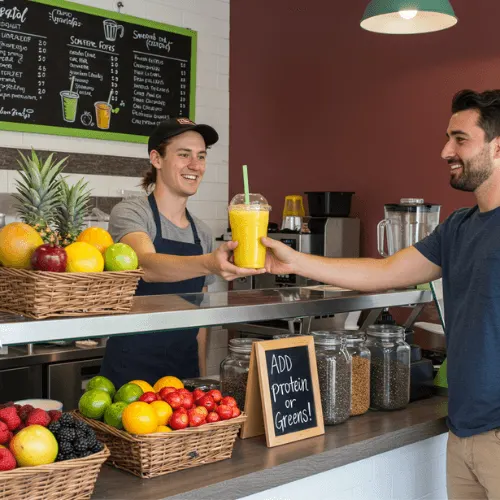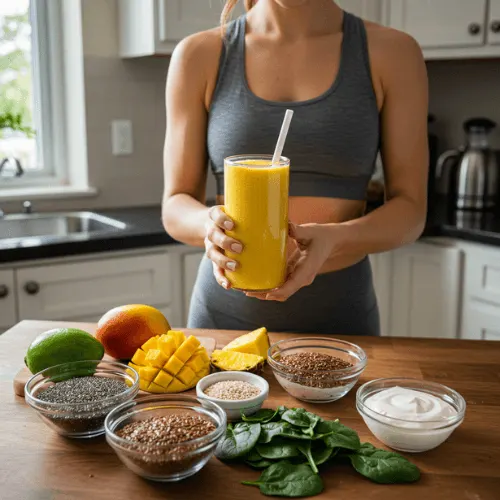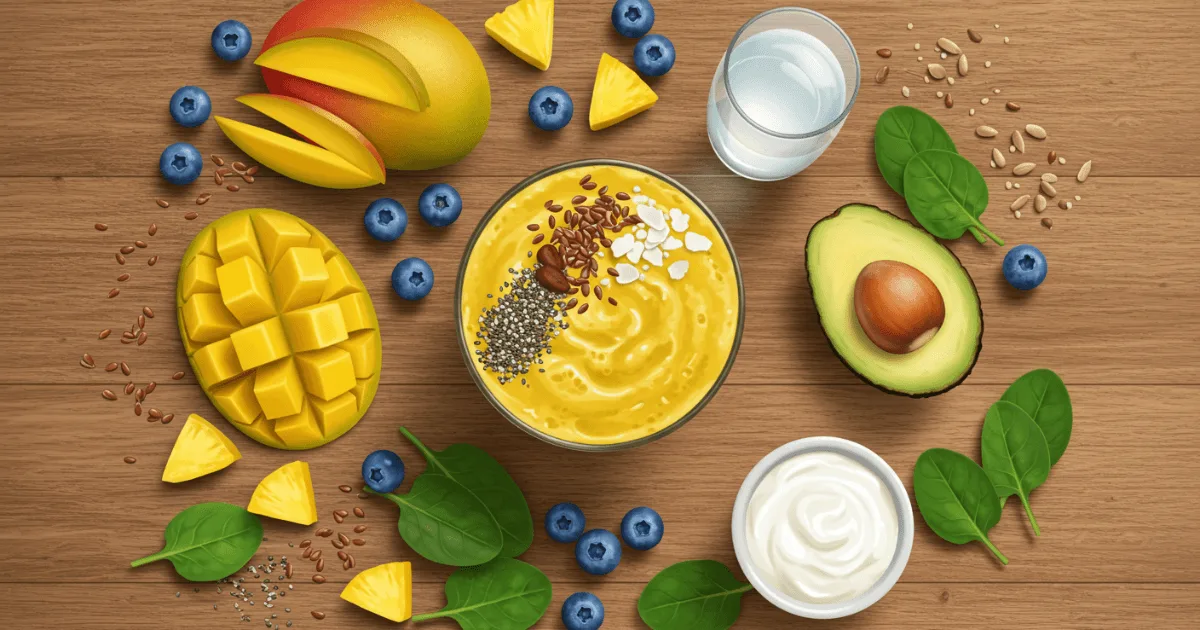Smoothies are now a regular feature in modern eating habits—swift, delectable, and often considered wholesome. Among the most popular? Tropical smoothies. With their vibrant colors and fruity flavors, they promise a taste of paradise while fueling your body with nutrients.
But here’s the question: Is Tropical Smoothie Healthy?
The answer isn’t black and white. While they can be a nutrient-packed powerhouse, many store-bought versions (and even homemade mistakes) turn them into sugar bombs disguised as health food.
Table of Contents
In this in-depth guide, we’ll explore:
✔ What makes a tropical smoothie healthy (or unhealthy)
✔ The hidden pitfalls of store-bought options
✔ 7 science-backed ways to boost nutrition
✔ A foolproof healthy tropical smoothie recipe
✔ How to order wisely at smoothie chains
By the end, you’ll know exactly how to enjoy tropical smoothies without sabotaging your health goals.
What Is a Tropical Smoothie?
A tropical smoothie typically includes fruits like pineapple, mango, banana, and sometimes coconut or passion fruit. These blends are often paired with fruit juice or sweetened yogurt to enhance flavor and texture. While they seem wholesome, many commercially prepared versions—especially at chains like Tropical Smoothie Cafe—can contain more sugar than a can of soda.
Common Ingredients in Tropical Smoothies:
- Fruits: Pineapple, mango, banana, papaya, orange
- Liquids: Orange juice, coconut water, almond milk
- Additional ingredients you can use: Greek yogurt, protein powder, chia seeds, honey, agave
- Extras in Store Versions: Sorbet, sugar syrup, flavored yogurt
Nutritional Snapshot of Key Ingredients:
| Ingredient | Calories | Sugar (g) | Fiber (g) | Vitamin C (%) |
|---|---|---|---|---|
| Pineapple (1 cup) | 82 | 16 | 2.3 | 131% |
| Mango (1 cup) | 99 | 23 | 2.6 | 67% |
| Banana (1 med) | 105 | 14 | 3.1 | 17% |
| Orange Juice (1 cup) | 112 | 21 | 0.5 | 207% |
These fruits are undeniably rich in vitamins, but the combination of naturally occurring sugars and added sweeteners can push your sugar intake higher than you might expect.
Is Tropical Smoothie Healthy? Here’s the Truth
So, is that bright yellow smoothie in your hand actually nourishing your body—or just giving you a sugar rush? The answer depends on what goes into it and how often you’re drinking it.
The Pros:
- Rich in vitamins like C, A, and potassium
- Packed with hydrating fruits
- Contains natural antioxidants
- Can boost energy levels naturally
The Cons:
- Often loaded with added sugars and fruit juice concentrates
- Low in protein and fiber, leading to quick blood sugar spikes
- Many store-bought options can reach 400–600 calories
Is Tropical Smoothie Cafe Healthy?
It depends. Tropical Smoothie Cafe does use real fruit, but many of their menu items include added sugar or syrups. Some smoothies also have high-calorie additions like peanut butter or full-fat dairy. However, they do offer customization, so you can ask to skip sweeteners or add protein.
7 Easy Ways to Make Your Tropical Smoothies Healthier (Without Sacrificing Flavor!)
Tropical smoothies are like a vacation in a cup—sweet, vibrant, and refreshing. But let’s be real: some can be sugar bombs in disguise. The good news? You don’t have to give up the deliciousness to make them good for you.
Whether you’re blending at home or grabbing one from Tropical Smoothie Cafe, these simple tweaks will keep the tropical vibes while ditching the junk. taste buds, and your digestive system will be pleased.
1. Skip the Juice—Go for Whole Fruit or Coconut Water
Juice might seem innocent, but it’s just sugar water, missing all the good stuff (like fiber) that makes fruit healthy. Instead:
- Use whole fruit (banana, mango, pineapple) to keep the fiber and avoid sugar crashes.
- Try coconut water for a light, hydrating base with natural electrolytes.
Pro tip: Next time you order out, ask to swap juice for coconut water or extra fruit. Most places will do it!
2. Sneak in Greens (You Won’t Even Taste Them!)
Spinach or kale in a tropical smoothie? Trust me, the mango and pineapple will overpower any “green” taste. Plus, you’ll get:
- Iron, magnesium, and antioxidants
- Better digestion + glowing skin
It’s a nutrition ninja move—zero effort, major payoff.
3. Add Healthy Fats to Stay Full Longer
If your smoothie leaves you hungry an hour later, it’s missing fats. Try:
- ½ avocado (creamy + dreamy)
- Chia seeds or nut butter (for staying power)
Fats also help your body absorb vitamins from the fruit and greens—win-win!
4. Protein = No More Mid-Morning Slump
Turn your smoothie into a real meal or recovery drink with:
- Greek yogurt
- A scoop of protein powder
- Hemp seeds
Bonus: Protein keeps your blood sugar steady, so no energy rollercoaster.
5. Balance Sweet Fruits with Low-Sugar Options
Like mango and pineapple, but can’t handle the sugar crash? Mix in:
- Berries (blueberries, strawberries)
- Green apple
They’re lower in sugar but still pack flavor and fiber.
6. Supercharge with Superfoods (If You Want!)
Want extra benefits? A tiny sprinkle of:
- Cacao nibs (for magnesium + mood)
- Turmeric (anti-inflammatory)
- Maca powder (energy boost)
…can take your smoothie from tasty to next-level nourishing.
7. Frozen Veggies = Secret Smoothie Hack
Craving a thick, creamy texture without extra sugar? Toss in:
- Frozen cauliflower
- Zucchini
- Sweet potato
They blend up super smooth, add fiber, and keep you full way longer.


Sample Healthy Tropical Smoothie Recipe
Tropical Green Energizer
| Ingredient | Amount |
| Frozen mango | 1/2 cup |
| Fresh pineapple | 1/2 cup |
| Spinach | 1 cup |
| Coconut water | 3/4 cup |
| Chia seeds | 1 tbsp |
| Avocado | 1/4 small |
| Greek yogurt | 1/4 cup |
| Ice cubes | Handful |
Instructions:
- Add all ingredients to a high-speed blender.
- Blend until smooth.
- Adjust the texture with more ice or coconut water.
- Serve immediately and enjoy.
Key Takeaways for Smarter Smoothie Choices
- Not all tropical smoothies are created equal.
- You control how healthy your smoothie is by what you put into it.
- Focus on whole ingredients, avoid added sugars, and balance your macros (carbs, protein, fat).
Whether you’re making them at home or ordering from Tropical Smoothie Cafe, the key is customization. Ask for no added sugar, skip syrups, and choose a protein-rich base.
FAQs: Is Tropical Smoothie Healthy?
Are Tropical Smoothie smoothies healthy?
They can be, especially when you control the ingredients. Homemade versions with balanced macros and no added sugar are typically healthier than store-bought versions.
Is Tropical Smoothie Cafe real fruit?
Yes, Tropical Smoothie Cafe uses real fruit, but some smoothies may also include juices or syrups that increase sugar content.
Is Tropical Smoothie Cafe healthier than Smoothie King?
It depends on the drink. Both offer healthy and indulgent options. Tropical Smoothie Cafe has more food offerings, while Smoothie King often promotes fitness-oriented blends. Check the nutrition info.
Are smoothies healthy?
Smoothies can be extremely healthy if made with whole fruits, vegetables, protein, and healthy fats. Avoid those with added sugars or too much fruit juice.
Is tropical fruit good for you?
Yes, tropical fruits like pineapple, mango, and papaya are rich in vitamins and antioxidants. However, they are higher in sugar, so portion control matters.
What is the healthiest option at Tropical Smoothie?
Look for smoothies with no added sugar, added protein, and greens. The “Detox Island Green” is a popular low-calorie, high-nutrient choice.
Conclusion: Blend Smart, Live Vibrantly
You now have the tools to answer the question: Is tropical smoothie healthy? With a few adjustments and a focus on whole, nutrient-dense ingredients, you can turn any tropical smoothie into a powerful part of your daily routine. Whether you’re blending at home or picking one up on the go, remember—you’re in control of what goes into your cup.
Don’t settle for sugar bombs disguised as health food. Blend smart, nourish deeply, and sip your way to better health—one vibrant smoothie at a time.


2 thoughts on “Is Tropical Smoothie Healthy? 5 Ways to Make It Even Better”